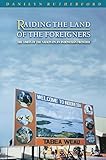Raiding the Land of the Foreigners : The Limits of the Nation on an Indonesian Frontier / Danilyn Rutherford.
Material type: TextPublisher: Princeton, NJ : Princeton University Press, [2021]Copyright date: ©2003Description: 1 online resource (321 p.) : 3 maps. 10 halftonesContent type:
TextPublisher: Princeton, NJ : Princeton University Press, [2021]Copyright date: ©2003Description: 1 online resource (321 p.) : 3 maps. 10 halftonesContent type: - 9780691223414
- SOCIAL SCIENCE / Anthropology / General
- Abraham, Nicolas
- Adadikam, Dominggus
- Bali, tourism on
- Berlin Conference
- Bonggoibo, Kundrad
- Boseren, Biromor
- Durkheim, Emile
- East Timor
- Freud, Sigmund
- Geertz, Cliffor
- Goffman, Erving
- Handler, Richard
- Indonesian
- Insulinde
- Kaisiëpo, Frans
- Kant, Immanuel
- Korps Márechausee
- Lawrence, Peter
- Lisan
- Lontar Foundation
- Malay
- Mambesak
- Orlove, Benjamin
- Osborne, Robin
- Pancasila
- Pietz, William
- Poe, Edgar Allan
- Rumaropen, Yakonius
- Shiraishi, Takashi
- Sor, church consecration at
- Spyer, Patricia
- Suharto
- Sukarno
- airport
- apocalypse
- cargo cults
- circulating connubium
- colonialism
- de Certeau, Michel
- dispute resolution
- ethnography
- fetishism
- flying fish
- globalization
- holidays and fear of separatism
- incest
- intoxicated people
- millenarianism
- performativity
- recognition
- recontextualization
- slavery
- soccer
- television
- travel
- online - DeGruyter
| Item type | Current library | Call number | URL | Status | Notes | Barcode | |
|---|---|---|---|---|---|---|---|
 eBook
eBook
|
Biblioteca "Angelicum" Pont. Univ. S.Tommaso d'Aquino Nuvola online | online - DeGruyter (Browse shelf(Opens below)) | Online access | Not for loan (Accesso limitato) | Accesso per gli utenti autorizzati / Access for authorized users | (dgr)9780691223414 |
Frontmatter -- Contents -- List of Illustrations -- Map -- A Note on Languages and Locations -- Preface: Becoming a Foreigner -- CHAPTER ONE. On the Limits of Indonesia -- CHAPTER TWO. Frontier Families -- CHAPTER THREE. The Poetics of Surprise -- CHAPTER FOUR. The Authority of Absence -- CHAPTER FIVE. Messianic Modernities -- CHAPTER SIX. The Subjection of the Papuan -- CHAPTER SEVEN. The Subject of Biak? -- Epilogue: On Limits -- Notes -- Glossary -- References -- Index
restricted access online access with authorization star
http://purl.org/coar/access_right/c_16ec
What are the limits of national belonging? Focusing on Biak--a set of islands off the coast of western New Guinea, in the Indonesian province of Irian Jaya--Danilyn Rutherford's analysis calls for a rethinking of the nature of national identity. With the resurgence of separatism in the province, Irian Jaya has become the focus of fears that the Indonesian nation is falling apart. Yet in the early 1990s, the fieldwork for this book was made possible by the government's belief that Biaks were finally beginning to see themselves as Indonesians. Taking in the dynamics of Biak social life and the islands' long history of millennial unrest, Rutherford shows how practices that indicated Biaks' submission to national authority actually reproduced antinational understandings of space, time, and self. Approaching the foreign as a focus of longing in cultural arenas ranging from kinship to Christianity, Biaks participated in Indonesian national institutions without accepting the identities they promoted. Their remarkable response to the Indonesian government (and earlier polities laying claim to western New Guinea) suggests the limits of national identity and modernity, writ large. This is one of the few books reporting on the volatile province of Irian Jaya. It offers a new way of thinking about the nation and its limits--one that moves beyond the conventions of both scholarship and recent journalism. It shows how people can "belong" to a nation yet maintain commitments that fall both short of and beyond the nation state.
Mode of access: Internet via World Wide Web.
In English.
Description based on online resource; title from PDF title page (publisher's Web site, viewed 24. Mrz 2021)


